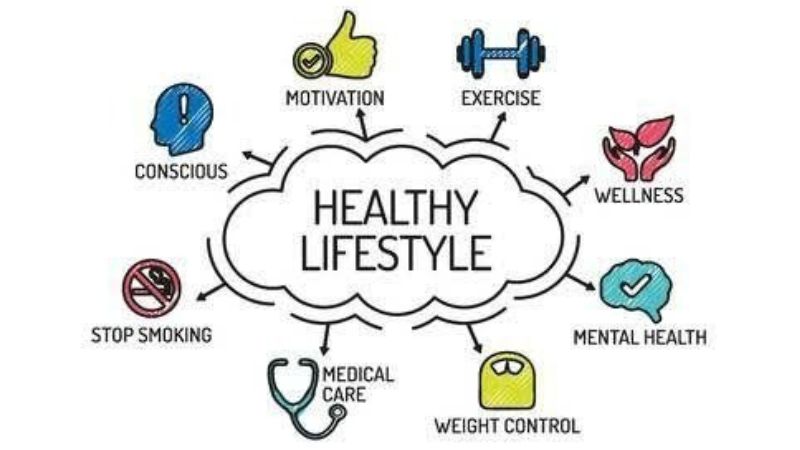In today’s fast-paced world, achieving and maintaining optimal health is more crucial than ever. Our holistic approach to health encompasses physical, mental, and emotional well-being, providing you with the tools and knowledge to live a balanced and fulfilling life. This comprehensive guide delves into essential aspects of health for life, offering practical advice and insights to help you thrive.
The Importance of a Balanced Diet
Nutrient-Rich Foods for Optimal Health For Life
A balanced diet is the cornerstone of good health. Consuming a variety of nutrient-rich foods ensures that your body receives the essential vitamins and minerals it needs to function effectively. Fruits and vegetables, whole grains, lean proteins, and healthy fats should be staples in your diet. These foods provide the necessary nutrients to support your immune system, improve digestion, and maintain energy levels.
Hydration: The Key to Vitality
Staying hydrated is crucial for overall health. Water plays a vital role in nearly every bodily function, including digestion, circulation, and temperature regulation. Aim to drink at least eight glasses of water daily, and adjust your intake based on activity level and climate. Proper hydration can enhance mental clarity, boost energy levels, and improve physical performance.
Exercise: The Pillar of Physical Health
The Benefits of Regular Physical Activity
Engaging in regular physical activity is essential for maintaining a healthy body and mind. Exercise helps to control weight, reduce the risk of chronic diseases, improve mental health, and enhance the quality of life. Incorporate a mix of aerobic exercises, strength training, and flexibility exercises into your routine to reap the maximum benefits.
Creating a Sustainable Exercise Routine
Establishing a sustainable exercise routine involves finding activities you enjoy and setting realistic goals. Start with moderate activities such as walking, cycling, or swimming, and gradually increase the intensity and duration. Consistency is key; aim for at least 150 minutes of moderate aerobic activity or 75 minutes of vigorous activity each week, complemented by strength training exercises twice a week.

Mental Health: Nurturing Your Mind
The Power of Mindfulness and Meditation
Mental health is just as important as physical health. Practices such as mindfulness and meditation can significantly improve mental well-being by reducing stress, enhancing self-awareness, and promoting emotional health. Dedicate a few minutes each day to mindfulness exercises, focusing on your breath and observing your thoughts without judgment.
Building Resilience and Coping Strategies
Building resilience involves developing the skills to cope with life’s challenges and bounce back from adversity. Effective coping strategies include maintaining a strong social support network, engaging in regular physical activity, and practicing relaxation techniques. Prioritize self-care and seek professional help if needed to manage stress and anxiety effectively.
Sleep: The Foundation of Health For Life
The Importance of Quality Sleep
Quality sleep is fundamental to overall health. It allows the body to repair itself, supports brain function, and boosts the immune system. Adults should aim for 7-9 hours of sleep per night. Establish a regular sleep schedule, create a restful environment, and avoid screens before bedtime to improve sleep quality.
Overcoming Sleep Disorders
Sleep disorders such as insomnia, sleep apnea, and restless leg syndrome can significantly impact health. If you experience persistent sleep issues, consult a healthcare professional for a proper diagnosis and treatment plan. Lifestyle changes, such as improving sleep hygiene and managing stress, can also help alleviate sleep problems.
Preventive Healthcare: Staying Ahead of Health Issues
Regular Health Screenings
Preventive healthcare involves regular screenings and check-ups to detect potential health issues early. Routine examinations such as blood pressure checks, cholesterol tests, and cancer screenings can identify problems before they become serious. Stay informed about recommended screenings for your age and health status and follow through with them diligently.
Vaccinations and Immunisations
Vaccinations are crucial for preventing infectious diseases. Ensure that you and your family are up-to-date with recommended vaccines, including the flu shot, tetanus, and measles-mumps-rubella (MMR) vaccine. Vaccinations not only protect you but also help prevent the spread of diseases within the community.
Healthy Habits for Longevity
Stress Management Techniques
Chronic stress can take a toll on both physical and mental health. Implementing stress management techniques such as deep breathing exercises, yoga, and hobbies can help mitigate the effects of stress. Regularly engaging in activities that bring you joy and relaxation is essential for long-term health.
Avoiding Harmful Substances
Limiting or avoiding harmful substances such as tobacco, excessive alcohol, and recreational drugs is crucial for maintaining health. These substances can lead to severe health issues, including heart disease, liver problems, and mental health disorders. Seek support if needed to overcome addictions and make healthier choices.
Building a Supportive Environment
Creating a Healthy Home Environment
Your home environment significantly impacts your health for life. Ensure your living space is clean, safe, and conducive to healthy habits. This includes proper ventilation, reducing allergens, and creating spaces for physical activity and relaxation.
Social Connections and Community Involvement
Strong social connections and community involvement are vital for mental and emotional health. Cultivate relationships with family, friends, and neighbours, and participate in community activities. Social support can provide a sense of belonging, reduce stress, and enhance overall well-being.
Conclusion: Your Path to Health for Life
Achieving and maintaining optimal health requires a holistic approach that includes a balanced diet, regular exercise, mental well-being, quality sleep, preventive healthcare, and healthy habits. By incorporating these elements into your daily life, you can enhance your well-being and live a healthier, more fulfilling life.



